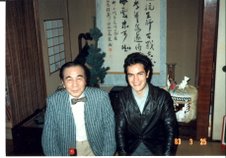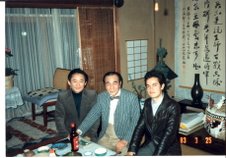Koussevitzky commission
For the last few months I have been battling with a piece for double bass and piano. Along with the trombone, this is the instrument in the orchestra I feel I understand the least. Its workings may be based on the same basic principles as those of the violin and the viola, of which I do claim a good knowledge. But the size, the tuning in fourths, the strings’ thickness and length, the very different proportions and resulting differences in the physicality between the player and the instrument, they all strike me as an unknown world. I would have never volunteered to write for it if someone else had not planted the idea in my head, in this case James Rapport, a professor at Vienna’s Bach Musikschule.
With impressive initiative, some time ago Professor Rapport offered to transcribe one of my existing pieces for the double bass. Partly in recognition of this commitment, partly from serious doubts that any of my existing pieces could be successfully adapted for the double bass, and partly, too, out of curiosity, I offered to write a new work instead. That is how I came to be treading this outlandish territory. It is a learning process, and I don’t find it easy.
Not many days ago, on Bolivia’s national day - 6 August - I received the wonderful news that the Koussevitzky Foundations (that is, The Serge Koussevitkzy Music Foundation in The Library of Congress and The Koussevitzky Foundation) had graciously decided to commission a new quartet from me for the Momenta Quartet. This brought me joy. At a time of dwindling opportunities in the UK this comes as a much-needed reminder that not all is indifference and that somebody has been listening, even some distinguished ears.
For quite some time I have been in awe at the stratospheric - and rising - standard of the performances the Momenta Quartet have been offering of my String Quartet No. 1, ‘Montes’. Their première of it in 2007 in Philadelphia was already the best I could have hoped for; their rendition at King’s Hall in Newcastle the following year was entrancingly impassioned. A recording they sent me of a performance at Cornell University last year (2010) shows them with a new lineup - three players have changed - but playing ‘Montes’ to something worryingly akin to perfection.
It was the Momenta who applied to Koussevitzky on my behalf, and the application’s success is, I am sure, in no small measure due to their rising prestige in the USA. To have one of the best commissions I know of to write music for one of the best quartets I know of makes a heady combination.
What makes Koussevitzky any more desirable than any other commission? History, of course. The list of previous recipients is a who’s-who of twentieth-century music, including some legends of the recent past. Next to those one holds close to the heart (Adams, Andriessen, Dallapiccola, Henze, Ligeti, Maw, Stravinsky) are names one cannot but respect (Babbitt, Birtwistle, Britten, Castiglioni, Malipiero, Messiaen, Schoenberg, Stockhausen). The list also includes other names that are less universally acclaimed, and even some others I hadn’t heard before, but I am not letting that dampen the joy, the illusion of breathing for a moment the same air as music's most exalted figures. Ultimately it boils down to this: if Koussevitzky enabled Bartók to compose Concerto for Orchestra, I am jolly proud to have Koussevitzky.
Am I slow or what. I was aware, I think, at all times, that the two venerable Foundations that made all these commissions had been set up in 1942 by Serge Koussevitzky (1874-1951), a Russian émigré to the US who was a celebrated conductor and entrepreneur. What at some point had slipped my mind was the fact that Serge Koussevitzky was also a virtuoso double-bass player, and the composer of a concerto and other pieces much prized in the repertoire. When the coincidence dawned on me, I wondered if my efforts grappling with the double bass had acted as an incantation that eventually worked the magic of attracting Koussevitzky to me. I know, their panel takes its own decisions oblivious to any incantatory attempts, based instead on scores and recordings from the composers and the track record of the performing organisation. But it is a temptation to think that I had been currying the eponymous maestro's favour even before the panel convened.
Meanwhile I grapple on.




No comments:
Post a Comment